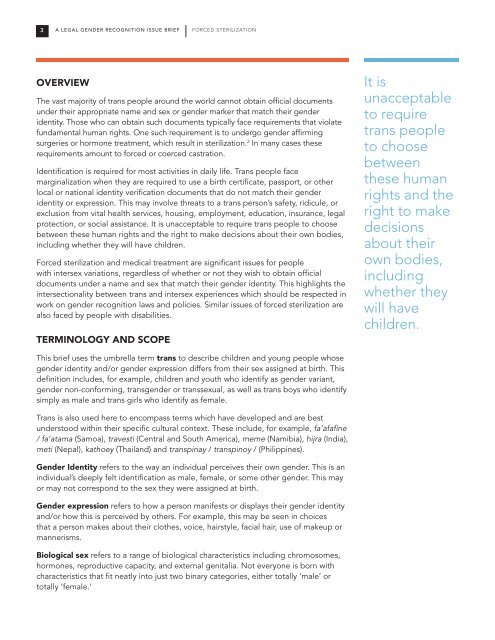FORCED STERILIZATION
lgr-forced-sterilization-20151120
lgr-forced-sterilization-20151120
Create successful ePaper yourself
Turn your PDF publications into a flip-book with our unique Google optimized e-Paper software.
3<br />
A LEGAL GENDER RECOGNITION ISSUE BRIEF<br />
<strong>FORCED</strong> <strong>STERILIZATION</strong><br />
OVERVIEW<br />
The vast majority of trans people around the world cannot obtain official documents<br />
under their appropriate name and sex or gender marker that match their gender<br />
identity. Those who can obtain such documents typically face requirements that violate<br />
fundamental human rights. One such requirement is to undergo gender affirming<br />
surgeries or hormone treatment, which result in sterilization. 2 In many cases these<br />
requirements amount to forced or coerced castration.<br />
Identification is required for most activities in daily life. Trans people face<br />
marginalization when they are required to use a birth certificate, passport, or other<br />
local or national identity verification documents that do not match their gender<br />
identity or expression. This may involve threats to a trans person’s safety, ridicule, or<br />
exclusion from vital health services, housing, employment, education, insurance, legal<br />
protection, or social assistance. It is unacceptable to require trans people to choose<br />
between these human rights and the right to make decisions about their own bodies,<br />
including whether they will have children.<br />
Forced sterilization and medical treatment are significant issues for people<br />
with intersex variations, regardless of whether or not they wish to obtain official<br />
documents under a name and sex that match their gender identity. This highlights the<br />
intersectionality between trans and intersex experiences which should be respected in<br />
work on gender recognition laws and policies. Similar issues of forced sterilization are<br />
also faced by people with disabilities.<br />
TERMINOLOGY AND SCOPE<br />
It is<br />
unacceptable<br />
to require<br />
trans people<br />
to choose<br />
between<br />
these human<br />
rights and the<br />
right to make<br />
decisions<br />
about their<br />
own bodies,<br />
including<br />
whether they<br />
will have<br />
children.<br />
This brief uses the umbrella term trans to describe children and young people whose<br />
gender identity and/or gender expression differs from their sex assigned at birth. This<br />
definition includes, for example, children and youth who identify as gender variant,<br />
gender non-conforming, transgender or transsexual, as well as trans boys who identify<br />
simply as male and trans girls who identify as female.<br />
Trans is also used here to encompass terms which have developed and are best<br />
understood within their specific cultural context. These include, for example, fa’afafine<br />
/ fa’atama (Samoa), travesti (Central and South America), meme (Namibia), hijra (India),<br />
meti (Nepal), kathoey (Thailand) and transpinay / transpinoy / (Philippines).<br />
Gender Identity refers to the way an individual perceives their own gender. This is an<br />
individual’s deeply felt identification as male, female, or some other gender. This may<br />
or may not correspond to the sex they were assigned at birth.<br />
Gender expression refers to how a person manifests or displays their gender identity<br />
and/or how this is perceived by others. For example, this may be seen in choices<br />
that a person makes about their clothes, voice, hairstyle, facial hair, use of makeup or<br />
mannerisms.<br />
Biological sex refers to a range of biological characteristics including chromosomes,<br />
hormones, reproductive capacity, and external genitalia. Not everyone is born with<br />
characteristics that fit neatly into just two binary categories, either totally ‘male’ or<br />
totally ‘female.’


